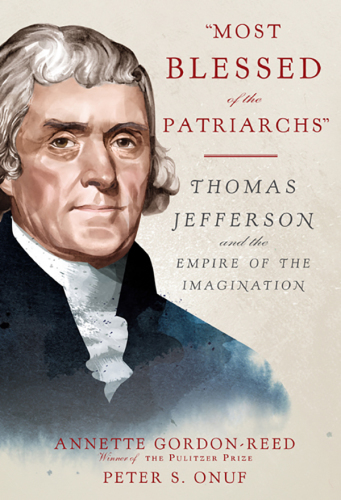
"Most Blessed of the Patriarchs"
Thomas Jefferson and the Empire of the Imagination
کتاب های مرتبط
- اطلاعات
- نقد و بررسی
- دیدگاه کاربران
نقد و بررسی

Starred review from February 8, 2016
Gordon-Reed, who won the Pulitzer Prize and National Book Award for The Hemingses of Monticello, and Onuf (The Mind of Thomas Jefferson), professor emeritus of history at the University of Virginia, probe the paradoxical figure of the third president, unpacking what Jefferson himself “thought he was doing in the world.” They neither indict nor absolve Jefferson; instead, they aim to make sense of his contradictions for modern sensibilities by mining familiar texts, as well as his actions as a Virginia plantation owner and American ambassador to France. Although considered progressive for his time, Jefferson was fully cognizant of the hypocrisy of owning slaves while fighting for liberation from Great Britain. Jefferson’s immersion in revolutionary France tempered his attitudes toward slavery, but did not persuade him to abandon it. He made his peace with this moral dilemma by striving to be the “kindest of masters.” The authors reveal what plantation family life meant to Jefferson and explain how his notoriously poor plantation management shaped the lives of Monticello’s enslaved people. They also offer fresh insights into his attitudes about privacy and religion, and his relationships with his wife, Martha, and his slave Sally Hemings. In seeking to reconcile the various strands of Jeffersonian thought and action, Gordon-Reed and Onuf have produced a fascinating addition to the Jefferson canon.

January 15, 2016
A portrait of Thomas Jefferson's passionate belief in Enlightenment values and how it determined his personal character and that of the young nation. Pulitzer Prize and National Book Award winner Gordon-Reed (American Legal History/Harvard Law School; The Hemingses of Monticello, 2009, etc.) and Onuf (Emeritus, History/Univ. of Virginia; The Mind of Thomas Jefferson, 2007, etc.) are fascinated by the many shifting "selves" of Jefferson: father, husband, slave owner, diplomat, politician, and cosmopolitan. His broad sense of himself as "the most blessed of patriarchs" is both a beautiful notion and mostly correct as well as a patronizing illusion considering that he was the master of numerous slaves at his Monticello plantation and, literally, their father. In this meticulously documented work exploring Jefferson's many roles in life, the authors take the great man at his word rather than how they think he ought to be: "We instead seek to understand what Thomas Jefferson thought he was doing in the world." Subsequently, the work proves to be a subtle, intriguing study of his Enlightenment ideals, beginning with his great hope in his fellow white Virginians as the ideal republicans who (with his help) abolished primogeniture, possessed a "fruitful attachment to land," and "knitted together...tender attachments," such as strategic arranged marriages among the upper class. However, his vision was problematic since he and his observant granddaughter Ellen, who lived for a spell in the North, documented well the differences between the slothful Southern temperament and the Northern industrious one, while the ills of slavery, which Jefferson himself wrote about in Notes on the State of Virginia, would not go away--and indeed, his own ties to the Hemingses could not be hidden. The authors make some trenchant observations regarding the effects of living in France on Jefferson's tempering of the republican ideals, in showing him both the dangers of extremism and the hope of "ameliorating" his slaves' conditions by incorporating them into his patriarchal family. An elegant, astute study that is both readable and thematically rich.
COPYRIGHT(2016) Kirkus Reviews, ALL RIGHTS RESERVED.

November 15, 2015
Gordon-Reed, here offering her first book in eight years since the Pulitzer Prize- and National Book Award-winning "The Hemingses of Monticello", joins forces with Onuf, the Thomas Jefferson Memorial Foundation Professor Emeritus at the University of Virginia, to offer a character study of Jefferson in all his contradictions. Thus do we discover Jefferson's "empire of the imagination."
Copyright 2015 Library Journal, LLC Used with permission.

























دیدگاه کاربران